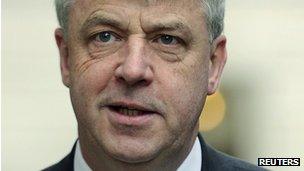Abortion clinic checks cost £1m
- Published

Andrew Lansley asked for the urgent inspections after concerns about some clinics
Urgent checks of abortion clinics ordered by the health secretary last month cost £1m and meant hundreds of other inspections were cancelled.
The Care Quality Commission (CQC) said the request at short notice from the Department of Health meant 580 pre-planned inspections were cancelled.
Time spent on planning and inspecting equated to 1,100 days, it said.
The department said the inspections had been agreed between the CQC and the health secretary.
It added that if the regulator had said more money was needed, it would have been provided.
The shadow health secretary, Andy Burnham, told the BBC he believed Mr Lansley had acted disproportionately and his actions gave the impression the health secretary was "chasing headlines" to put himself in a stronger position following criticism over his controversial changes to the NHS.
Details of the impact of the inspections were released after a Freedom of Information Act request from the BBC.
Health Secretary Andrew Lansley requested the CQC checks after concerns were raised about consent forms being pre-signed.
The inspectors visited nearly 300 abortion providers in England over three days in March, and found about 50 were not complying with laws or regulations.
Several doctors were referred to the General Medical Council, and police have been investigating too, to establish whether criminal offences have been committed.
'Considerable impact'
But the BBC understands that such inspections would not normally have been carried out on such a scale by the CQC, which inspects hospitals, dentists, care homes and domestic care to ensure they are meeting government standards.
In a letter to the Department of Health, CQC chairwoman Dame Jo Williams said the urgent inspections have had "a considerable impact on our capacity to deliver our annual targets".
"Such a request at short notice entails Operations management time in planning the visits, cancelling pre-planned inspections as well as the compliance inspector time in carrying out the visits and drafting the reports."
Dame Jo outlined the impact on scheduled activity in the letter, saying that 320 locations would require visits, with the total number of days required - including for planning and management - being 1,100.
"This equates to a total of 580 inspections foregone and a total of 16 inspectors being utilised on a full year basis at an estimated cost of £1.0m," she wrote.
She also asked that the department take into account such an impact on planned work "when considering future requests and delivery within a time limited period".
A source at the Department of Health told the BBC that Andrew Lansley had a statutory duty to respond when presented with allegations that abortion clinics were breaking the law.
They said the inspections were agreed with the chair of the CQC, Dame Jo Williams, and were not ordered by Mr Lansley.
'Chasing headlines'
Mr Burnham said it was right that serious concerns raised about some abortion clinics were referred to the regulator but the way the health secretary did this was questionable.
He said: "Firstly, in the week beginning Monday 19 March, he ordered an immediate inspection of 320 clinics which had a major knock-on effect on the CQC's work programme.
"But the surprising thing is just four days later in the middle of this inspection programme the secretary of state communicated his - the - early findings to a newspaper before the inspection programme was complete and indeed before any statement had been made before Parliament.
"And that gives the clear impression that Mr Lansley was chasing headlines rather than following due process and indeed compromised the independence of the regulator," he added.
Conservative MP Stephen Dorrell - who chairs the Health Select Committee - told BBC Radio 4's Today programme that first there had to be clarity over the CQC's role.
"We need to be clear whether the priorities of the regulator are genuinely determined independently by the CQC itself or whether the priorities are determined by the secretary of state. Is it independent or is it not?"
Mike Farrar, chief executive of the NHS Confederation, which represents NHS managers agreed there needed to be more transparency about the extent of the CQC's independence.
He also told Today Mr Lansley had legitimately asked the regulator to look into the abortion clinics issue.
He added: "But the point is there was a work programme agreed for CQC that put priorities into other areas and I think it's entirely legitimate for the regulator to turn around and say 'well this might divert from other issues, is that what you want to do?'"
"I think we should be clear about the consequence of taking on additional work. Indeed, the secretary of state could have provided additional money for that work to be undertaken."
The work of abortion clinics first came under the spotlight in February when the Daily Telegraph secretly filmed doctors and alleged some were agreeing to terminate foetuses when women did not want their baby because of its gender.
Mr Dorrell added that he felt Mr Lansley could have handled the situation better.
"What should have happened - probably - is that he should have drawn attention to the fact that this was an issue in the newspapers, invited [the CQC] to consider that in the context of their other priorities.
"You always get into trouble in any walk of life if you claim for yourself the ability to determine one priority without looking at all the others," he said.
Police are investigating the newspaper's allegations.
The Department of Health and CQC declined BBC Radio 4 Today requests for an interview.
- Published23 March 2012